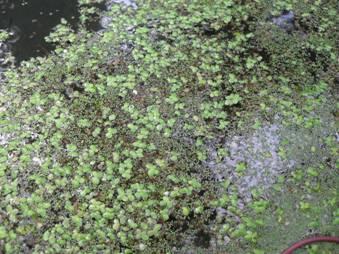
Duckweed (Lemna), fam. Lemnaceae.
In summer, spreading abundantly on the surface of our lakes, especially those protected from the wind and currents, duckweed may give not very pleasant look, a feeling of "green melancholy". However, this plant is quite beneficial – it effectively removes various contaminants from the water and saturates it with oxygen, also providing a lot of food to many fish and birds. In the evolution process, duckweed has lost its roots and leaves – only the flat stem has remained, forming numerous children plants by vegetative propagation. Duckweed can bring some flowers, but this is extremely rare. In winter, most plants sink down, to avoid freezing, and float again in spring.
Nutritional value of duckweed for livestock is widely acknowledged. It is rich in minerals, its protein has enough of all essential amino acids. It would be useful for human nutrition as well, but unfortunately there is a great risk of contaminations and infections concentrated on the lake surface. Duckweed is sometimes used to reduce the sensitivity of the body to harmful substances and allergens, against skin diseases, colds, inflammations, and fevers.